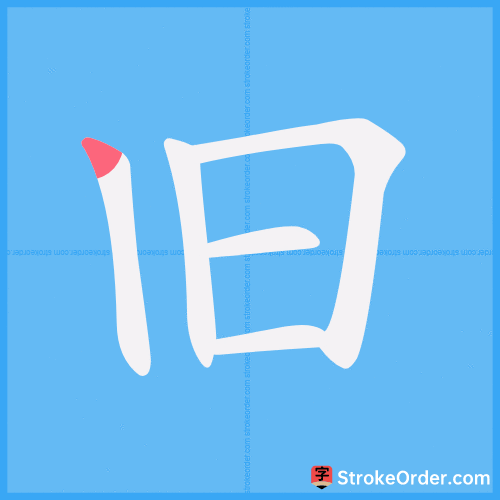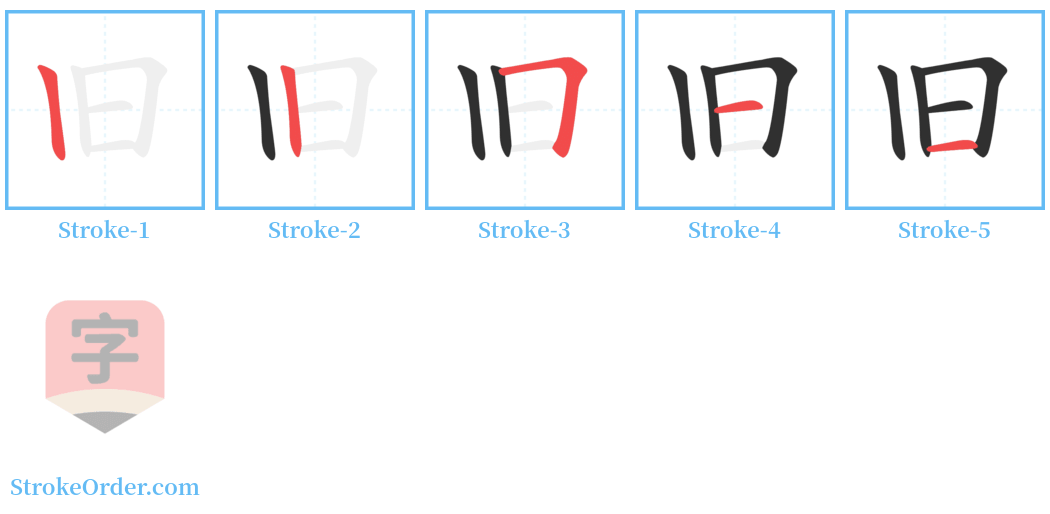旧 Stroke Order
Animated Stroke Order of 旧

Stroke Order Diagrams for 旧

Step-by-Step Handwriting Guide for 旧

Learn to Write Chinese Characters with Video Tutorials
Watch the video of writing the Chinese character "旧", learn the correct stroke order (笔顺) of the character "旧", and master the standard way of writing the character "旧".
Free Printable Handwriting Practice with Stroke Order: 旧
Printable Writing Practice Worksheet of "旧" in Portrait Orientation (Tian Zi Ge)

Printable Writing Practice Worksheet of "旧" in Landscape Orientation (Tian Zi Ge)

Information of 旧
Pinyin
jiù
Radical
日
Strokes
5 strokes
Usage
★★★★★
Definition
old (opposite of new) / former
旧
jiù
【名】
1. 过时的,与“新”相对。
Old, outdated; opposite of "new".
例: 旧式 (old style), 旧俗 (outdated customs).
2. 东西因经过长时间而变了样子。
An item that has changed in appearance over a long time.
例: 旧衣服 (old clothes), 旧书 (old book).
3. 原先曾有过的,过去很长时间的。
Something that was originally had; something from a long time ago.
例: 旧居 (old residence), 旧友 (old friend).
4. 有交情,有交情的人。
Having a friendship; someone with whom one has a close relationship.
例: 故旧 (old friends), 念旧 (reminiscing about past friendships).
【形】
1. 过时的;陈旧的(跟“新”相对)。
Old; used; worn (as opposed to "new").
2. 从前的;原先的。
Former; original; of the past.
3. 长久。
Long; lasting.
例: 旧牌儿 (old score), 旧纸 (old currency), 旧衣服 (old clothing), 旧流丢 (worn-out appearance).
---------------
旧
jiù
【名】
1. 鸺鶹,即猫头鹰。
The owl (En. owl).
2. 故交,老交情。
An old friendship (En. old friendship).
3. 原有的典章制度。
Old institutions (En. old institutions).
4. 指世族。
Referring to an aristocratic family (En. aristocratic family).
5. 通“丘”。丘冢,坟墓。
Refers to a mound or grave (En. mound; grave).
---------------
【形】
1. 旧的;陈旧的 (跟“新”相对)。
Old; used; worn (as opposed to "new").
2. 从前的;原先的。
Of the past; former.
3. 长久。
Long.
-------------
例: 懷舊 (nostalgia), 有旧 (have a past), 念旧 (long for the old days), 亲戚故旧 (relatives and old friends), 旧雨 (old friends).
lit. to like the new, and hate the old (idiom); fig. enamored with new people (e.g. new girlfriend), bored with the old
Input Method for 旧
Pinyin
jiu4
Wubi
hjg
Cangjie
la
Zhengma
ikvv
Four Corner
26000
Unicode
U+65e7
Same Pronunciation Characters